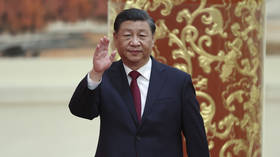US defense act is a ‘political provocation’ – China

The US National Defense Authorization Act, signed into law by President Biden on Friday, hypes up the “China threat,” interferes in the country’s internal affairs and attacks the Chinese Communist Party, Beijing insisted on Saturday.
The $858-billion military spending program for fiscal year 2023 is “a serious political provocation against China,” the foreign ministry has pointed out in a statement. Beijing “deplores and firmly opposes” the new legislation, it added.
The US defense act, which authorized $10 billion in security assistance and fast-tracked weapons procurement for Taiwan, is sending “a gravely wrong signal to ‘Taiwan independence’ separatist forces and severely affects peace and stability across the Taiwan Strait,” it said.
The island of Taiwan has been self-governed since 1949, but never officially declared independence from Beijing, with China viewing it as part of its territory. Tensions between Beijing and Taipei have been high since the visit of US House speaker Nancy Pelosi to Taiwan in August.
“The US needs to stop seeking to use Taiwan to contain China, stop fudging, distorting and hollowing out the One-China principle, and stop moving even further down the wrong and dangerous path,” the ministry warned.
Among other things, the bill also contained an amendment that restricted US government agencies from buying products that contain computer chips made by a specific group of Chinese companies.
Beijing has urged Washington to refrain from implementing the “negative China-related sections” in the act or face “strong and resolute” counter-measures. According to the foreign ministry, it would be beneficial for both sides if the US gives up on its “Cold-War and zero-sum mentality” and develops a rational view on relations with China.













